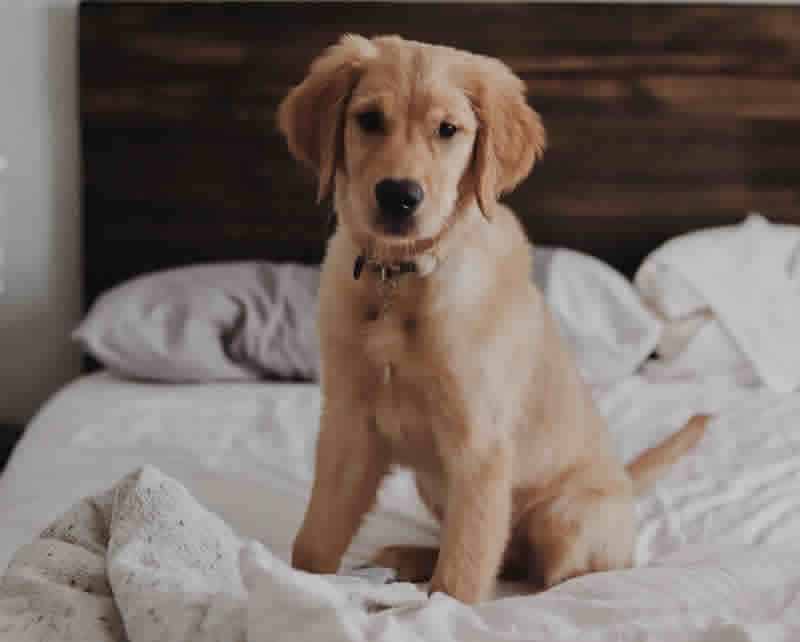This can be a controversial question as some dog owners have no problem allowing a puppy to sleep in their bed whereas other dog owners would never dream of allowing this sleeping arrangement. At the end of the day, the decision is yours alone to make. Dogs are naturally sociable animals and they have been around humans for over 14,000 years and consequently happily co-exist with us.
When a new puppy arrives it can be a scary time for this little fur baby. He’s just left his mam and siblings and is now in new surroundings. What he needs right now is reassurance, security, and of course endless love from you. For the next few days or weeks and sometimes even years this little puppy will be like your shadow, following you with every move.
You need to make some decisions and one major decision to make is where would you like this new little fur baby to sleep. Will the new puppy be allowed to sleep upstairs or downstairs?
The thing to remember is that puppies are adaptable and so long as drastic changes are not made in one go they can adjust to new surroundings. When the new puppy arrives a suggestion could be to place the pup’s bed or crate in the bedroom right beside your own bed.
The puppy does not have to be in your bed so long as you are close by and the puppy can see and hear you this will give him reassurance to know that all is safe and he can sleep soundly. Then gradually over the next few days move the puppy’s bed or crate further away from the bed. This gradual adjustment gives the puppy a chance to deal with the adjustment and it can be hardly noticeable if done gradually. Another useful advantage in having your fur baby nearby is that it will be useful when he needs to go potty. You don’t have to go that far and your little fur baby is learning to let you know when it’s toilet time.
Downsides of A Puppy Sleeping In Your Bed
Accidents At Night
If you choose to have your fur baby in the bed beside you the biggest downside is simply wetting the bed. The bigger the puppy the bigger the mess not so make sure you have a mattress protector and plenty of spare sheets and extra duvets on hand.
Plan Ahead
Another downside is that once you start allowing your bed to be used it will soon become the norm. You should think and plan ahead before making this choice as some puppies grow quickly into big adolescents. Can you imagine sharing a bed with an Irish Wolfhound or Great Dane? No doubt there are dog owners out there who do and that’s fine if it works for them however if you change your mind about where the puppy will sleep in a few weeks time it will cause some disruption.
Summer Nights
However, if the puppy sleeps in your bed it’s worth remembering that puppies have a higher body temperature than humans. In a hot bedroom at night there is the possibility that your puppy could overheat under that duvet so ideally use air conditioning if available or else a fan could be used to circulate cooler air. You may have forgotten that it gets really hot upstairs in the summer months and for your dog’s own benefit it would be better for him to sleep downstairs.
Parasites
Unfortunately, dogs and especially puppies can be infected with parasites such as fleas and worms. This can freak some people out but the main thing to remember is that you can treat these issues. However, having an infected puppy sleep in your bed could complicate the problem. The entire sleeping area will have to be disinfected and cleaned thoroughly
Puppies will need to be wormed after birth and there can be occasions where they are still infected. Unfortunately, humans can pick up worms such as roundworm from an infected puppy, and sleeping so close to a puppy will increase your chance of exposure. You can even pick up roundworms from a puppy licking you
Try A Compromise
If you still want your puppy near you at night-time then propose a compromise. I’m sure your puppy will agree to this. Place your puppy’s bed right next to your bed.
A recent finding from a Mayo Clinic study on the effects of dogs in human sleep found that the presence of a dog in the bedroom does not adversely affect human sleep this was contrary to what was expected.
However, this Mayo Clinic study found that the efficiency of human sleep was lower if the dog was in the actual bed and not just in the bedroom.
Sleeping Patterns for Young Puppies
The US National Library of Medicine National Institutes of Health published a paper in July 2020 that looked at Sleep Duration & Behaviors for Dogs from 16 weeks to 12 months. It mentioned that the topic of sleep in dogs is rarely studied.
The main findings included the following:
- It noted that puppies aged 16 weeks slept more over the entire 24 hours than dogs aged 12 months.
- Puppies at 16 weeks also slept significantly more during the day but the interesting point is that these younger puppies slept less during the night than pups aged 12 months.
- Dogs aged 12 months sleep most often in dog beds whereas their younger counterparts aged 16 weeks mostly sleep most often in a kennel/crate.
- Another interesting finding is that the majority of dog owners settled their dogs by leaving them in a room or area without human interaction. And it’s no surprise to learn that dogs who had access to people during the night the vast majority of dogs (87%) chose human company.
Tips for Puppy Daytime Naps
Devise A Schedule
All dogs and puppies thrive on a routine or schedule so the sooner you start the better. Puppies thrive on routine and can learn quickly what is expected of them. So devise a schedule that takes into account that puppies will tire after playtime and exercise all puppies will tire after exercising and playtime so devise a schedule that takes this into account. So after a walk or active playtime encourage calm things down. Don’t excite the puppy and give him space to quieten down.
Daytime sleeping or napping is perfectly normal for puppies. These siestas or naps can last from half an hour to 2 hours or more. As time passes, this sleep or nap schedule will become ingrained in their body clocks so they will soon learn the routine
No Naps on The Lap
I know it’s really tempting and cute to have a young puppy fall asleep on your lap. The problem is that this type of behavior will set a precedent for the puppy and he may soon expect that this is the best place to nap. And why not from the puppy’s perspective. It’s lovely and warm and cozy and he feels safe there. It could become a habit and as we know habits are hard to break.
No Disturbances
The best thing you can do is to leave your pup sleep peacefully on his own without any disturbances from family members. So long as the puppy feels safe and secure he will fall asleep. Sleeping is vital for puppies to ensure that they grow into healthy adult dogs
if you have children it’s best for the well-being of the pup if he is allowed to sleep without anybody cuddling him or picking him up. When the puppy wakes he will be only too happy to have plenty of playtime with the kids
Recognize Signs of Tiredness
You will soon learn to pick up on the signs that your puppy is tired. As we mentioned earlier puppies are like babies and as they grow they turn into toddlers and we have all heard of the terrible twos. If you have an overtired puppy it can be the same as dealing with an overtired toddler. From personal experience an overtired toddler can be a handful they don’t know what they want and can cry and lash out at anyone and everything. Well, it’s the same for an overtired puppy.
Puppies can become irritable and sometimes show signs of aggression and unfortunately, this can lead to nipping and biting. The pup is acting out of character simply because he did not get enough sleep.
Tips for Puppy To Sleep At Night
Lots of Play & Exercise
Puppies are normally very active and will enjoy playtime and exercise. They love to interact and play games. Try to ensure your little fur baby has plenty of stimulation with toys and chew items so as he does not get bored. A bored puppy can be destructive. Have the puppy use his brain to find hidden healthy treats.
Unless your puppy is fully vaccinated, unfortunately outside walks will have to be put on hold. However, you can still play in your house or apartment or if lucky enough to have a backyard.
Before Bedtime Puppy Needs A Potty Break
Before your puppy settles down for the night he will have to relieve himself one final time before bedtime. Without getting the puppy excited calmly bring him outside. Once the business is complete again shower the puppy with lots of praise. This will instill confidence and let him know that he is doing things right. Puppies always want to please. After the business is complete walk back inside in a non-rushed way and then take him to his bed.
No Food or Water Before Bedtime
You should try and stop all food about 3 hours before bedtime and the last drink usually an hour before sleep time. This will lessen the chances that the puppy will have to urinate or poop during the night. There may still be a call to action but it may not be as frequent.
No Excitement Stimulation
Never excite or engage in active physical play with your puppy just before bedtime. There should be a wind-down time where it gives him a chance to calm down.
Make Bedding Cozy
Ensure that the puppy has everything he needs before sleep. A nice cozy blanket, chew toys, etc. Puppies enjoy their comforts too and a warm inviting bed can be very appealing to a tired puppy. You might even leave an item of your clothing in the bed as the smell scent from it will give comfort and reassurance to your puppy. Puppies feel reassured and if they have your scent at hand and they will be less likely to become anxious or lonely.
Quite Things Down
Before your puppy’s bedtime make sure the atmosphere surrounding the bed is quiet and relaxing. You might even play some soothing music or even soft natural nature sounds.
Wait Before Running To Puppy Cries
Do not run immediately upon hearing cries and whining. If you do a puppy will soon learn that you come running with puppy sounds. Some puppies will naturally whine and cry at night. It can be a few days before they settle so you could have some nights where your own sleep is affected. However, as mentioned earlier you could always take your new fur baby to your bedroom. Then it’s a matter of slowly moving your fur baby’s bed further away from your bed bit by bit. A new puppy may be lonely and scared for the first few nights and the closeness to you will give him reassurance and security.

Sources







